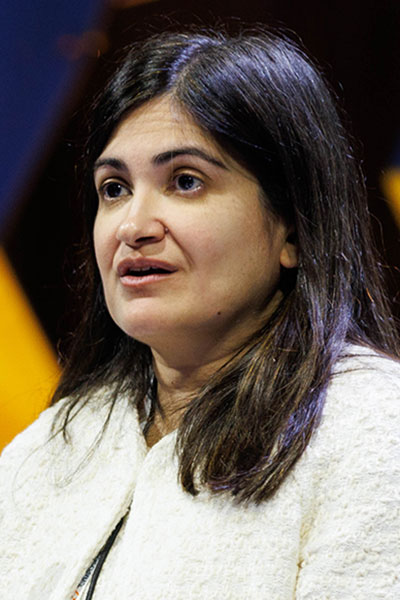During General Session 2 at the 2023 SABCS® on Thursday morning, researchers presented findings from 10 studies exploring a variety of important questions in the treatment and management of breast cancer patients. Following are highlights and key findings from four of the abstracts presented.
The entire session is available on demand for registered SABCS® participants through March 31, 2024, on the meeting platform.
GS2-07: Loco-Regional Irradiation in Patients with Biopsy-proven Axillary Node Involvement at Presentation Who Become Pathologically Node-negative After Neoadjuvant Chemotherapy: Primary Outcomes of NRG Oncology/NSABP B-51/RTOG 1304
For patients whose breast cancer converted from lymph node-positive to lymph node-negative disease after neoadjuvant chemotherapy, skipping adjuvant regional nodal irradiation (RNI) did not increase the risk of disease recurrence or death five years after surgery, according to results from the NRG Oncology/NSABP B-51/RTOG 1304 clinical trial.

Findings from this study were presented by Eleftherios (Terry) Mamounas, MD, MPH, Chair of the NRG Oncology Breast Committee, Professor of Surgery at the University of Central Florida, and Medical Director of the Comprehensive Breast Program at the Orlando Health Cancer Institute.
“We know that, for patients who undergo upfront surgery and are found to have pathologically positive axillary lymph nodes, the benefit of adjuvant regional nodal irradiation including the chest wall after mastectomy or when added to whole breast irradiation after breast-conserving surgery is well established,” Dr. Mamounas said. “However, patients who present with axillary lymph node involvement and then receive neoadjuvant chemotherapy and are found to be pathologically node-negative at surgery—what we call ypN0—have lower locoregional recurrence rates compared to those who remain pathologically node-positive.”
With that background in mind, Dr. Mamounas and his colleagues designed this phase 3 randomized clinical trial to evaluate whether chest wall irradiation plus RNI after mastectomy or whole breast irradiation plus RNI after breast-conserving surgery significantly improves invasive breast cancer recurrence-free interval in clinically node-positive patients who are found to be ypN0 after neoadjuvant chemotherapy.
The study enrolled 1,641 patients diagnosed with lymph-node positive, nonmetastatic breast cancer whose lymph nodes were found to be cancer-free after neoadjuvant chemotherapy and who had undergone either mastectomy or breast-conserving surgery.
Patients were randomly assigned 1:1 to either the “no RNI” arm (observation after mastectomy or whole breast irradiation after breast-conserving surgery) or the “RNI” arm (chest wall irradiation plus RNI after mastectomy or whole breast irradiation plus RNI after breast-conserving surgery).
Among their findings, Dr. Mamounas reported that evaluable patients (1,556 patients) had similar outcomes whether they received adjuvant RNI or not: 91.8% of patients in the “no RNI” arm and 92.7% of those in the “RNI” arm were free of invasive breast cancer recurrences five years after surgery. Distant recurrence and overall survival rates were also similar between the arms: 93.4% of patients in each arm were free from distant recurrence five years after surgery, and 94% of those in the “no RNI” arm and 93.6% of those in the “RNI” arm were alive after five years.
“Our findings suggest that downstaging [the] involved axillary nodes with neoadjuvant chemotherapy can optimize adjuvant radiotherapy use without adversely affecting oncologic outcomes,” Dr. Mamounas said. “Follow-up of these patients for long-term outcomes continues.”
GS2-08: Five-year outcomes of the IDEA trial of endocrine therapy without radiotherapy after breast-conserving surgery for postmenopausal patients age 50-69 with genomically-selected favorable stage I breast cancer
Almost all postmenopausal patients aged 50-69 years with stage I hormone receptor-positive breast cancer and low scores on a common genetic test who opted out of adjuvant radiotherapy were disease free five years after surgery, according to results from the IDEA clinical trial, suggesting that younger postmenopausal patients with early-stage breast cancer may be able to safely omit adjuvant radiotherapy.

Findings from the trial were presented by Reshma Jagsi, MD, DPhil, the Lawrence W. Davis Professor and the Chair of Radiation Oncology at the Emory University School of Medicine and a researcher at the Winship Cancer Institute of Emory University.
“Multiple randomized trials have demonstrated that radiotherapy after breast-conserving surgery substantially improves the local control of invasive breast cancer, and an Early Breast Cancer Trials Collaborative Group (EBCTCG) meta-analysis suggests a modest survival benefit,” Dr. Jagsi said. “However, not all subgroups attain the same absolute benefit from radiation therapy, and the survival benefit does appear to be restricted to those who have a larger absolute reduction in recurrence risk from radiotherapy.”
This, she said, points out the need for further research to identify a subgroup of patients who, after breast-conserving surgery, might have a sufficiently low absolute risk of local recurrence and might reasonably choose to forgo the additional benefit that would be anticipated from radiotherapy.
To determine if omitting radiotherapy would be feasible for younger postmenopausal patients with early-stage breast cancer, Dr. Jagsi and colleagues initiated the IDEA clinical trial, which enrolled patients between 50 and 69 years of age who had stage I HR-positive, HER2-negative breast cancer. The Oncotype DX recurrence score was used to determine each patient’s risk of recurrence based on the genetic profiles of their tumors. Patients with a low risk of recurrence were eligible to skip radiotherapy after breast-conserving surgery while still receiving standard-of-care adjuvant endocrine therapy for at least five years.
Among their findings, Dr. Jagsi reported that patients enrolled in the study were eligible to skip radiotherapy (60 patients ages 50-59 and 140 patients ages 60-69). Among 186 evaluable patients, 100% were alive five years after surgery, and 99% (184 patients) were breast cancer free at this time.
“Long-term follow-up of this trial and others are essential to help determine whether the option of avoiding initial radiotherapy can be offered to a broader group of women than current guidelines recommend,” Dr. Jagsi said. “What is really important here is that these efforts strive to empower patients with choices and return to them a sense of agency that can be deeply meaningful in the context of a recent cancer diagnosis.”
GS2-10: Effects of a structured and individualized exercise program on fatigue and health-related quality of life in patients with metastatic breast cancer: the multinational randomized controlled PREFERABLE-EFFECT study
Among patients with metastatic breast cancer, those who took part in a nine-month structured exercise program reported less fatigue and an improved quality of life compared to those who did not undergo the exercise program, according to results from the PREFERABLE-EFFECT trial.

The latest findings from this trial were presented by Anne May, PhD, Professor at the Julius Center for Health Sciences and Primary Care at the University Medical Center, Utrecht, in the Netherlands.
“Last year, there was an ESCO guideline published providing guidance to clinicians on exercise during treatment for cancer,” Dr. May said. “After a thorough literature review, it was concluded that there is strong evidence that exercise during adjuvant cancer treatment leads to improvements in cardiorespiratory fitness, strength, fatigue, and other patient-reported outcomes. So, the recommendation was that oncology providers should recommend regular aerobic and resistance exercise during active treatment with curative intent.”
However, she noted that there were some gaps in the literature: It was not possible to make recommendations to patients in the metastatic setting because of a lack of studies in that setting, which led to the launch of the PREFERABLE-EFFECT trial.
In the trial, 357 patients with metastatic breast cancer were enrolled. All participants in the trial received a physical activity tracker and generic exercise advice; 178 patients were randomly assigned to nine months of twice-weekly supervised exercise sessions involving balance, resistance, and aerobic exercises.
At enrollment and after three, six, and nine months, the participants were surveyed using the European Organisation for Research and Treatment of Cancer Quality of Life Questionnaire (EORTC-QLQ-30), a comprehensive questionnaire assessing patients’ physical, mental, emotional, and financial quality of life. Additionally, the EORTC-FA12 questionnaire was used to assess multidimensional fatigue among the participants.
Among their findings, Dr. May reported that, at six months, patients assigned to the exercise intervention reported significantly better scores on important EORTC-QLQ-30 subscales, compared with those in the control arm, including a 5.5-point increase in social functioning, a 7.1-point decrease in pain, and a 7.6-point decrease in shortness of breath.
“We found that a supervised resistance and aerobic exercise intervention resulted in beneficial effects on fatigue, on health-related quality of life, and other clinically relevant outcomes of patients with metastatic breast cancer,” she said. “So we recommend adding supervised exercise as part of supportive care regimens during palliative treatment, and actually, I think that we should consider exercise as being part of the treatment that all patients with metastatic cancer receive.”
GS2-11: Fertility preservation and assisted reproductive technologies (ART) in breast cancer (BC) patients (pts) interrupting endocrine therapy (ET) to attempt pregnancy

Using fertility preservation and/or assisted reproductive technologies (ART) did not adversely impact three-year cancer recurrence rates among patients with hormone receptor (HR)-positive breast cancer who paused endocrine therapy to become pregnant, according to results from the POSITIVE trial, which were presented by Hatem A. Azim Jr., MD, PhD, Adjunct Professor at the School of Medicine and Breast Cancer Center at the Tecnológico de Monterrey in Mexico.
“Last year at this meeting, we presented the primary results of the POSITIVE trial showing that temporary interruption of endocrine therapy to attempt pregnancy does not impact disease outcomes, at a median follow-up of 41 months,” Dr. Azim said. “Yet, uncertainty exists regarding the efficacy and safety of ovarian stimulation for fertility preservation and the use of assisted reproductive technologies (ART) in women with early hormone receptor-positive breast cancer desiring future pregnancy. We tried to address this in the POSITIVE study.”
Dr. Azim presented data showing that, among the 497 evaluable participants who paused endocrine therapy to attempt pregnancy, 368 (74%) became pregnant. Among the patients who underwent some form of fertility preservation, 179 used embryo or oocyte cryopreservation prior to enrollment in the POSITIVE trial, while 215 used some form of ART to attempt pregnancy. The most commonly used ART was ovarian stimulation for in vitro fertilization and cryopreserved embryo transfer.
The study found that younger age and cryopreserved embryo transfer were the factors most associated with higher chances of pregnancy, with 82.4% of patients who underwent cryopreserved embryo transfer becoming pregnant. Additionally, he reported that ovarian stimulation for cryopreservation, which precedes cryopreserved embryo transfer, was not associated with worse disease outcomes.
“This is the largest prospective study to investigate fertility preservation and ART in patients with hormone receptor positive breast cancer who desired pregnancy,” Dr. Azim said. “We believe that these data are of paramount importance for the oncofertility counseling of young breast cancer patients.”
Following are all of the abstracts presented during General Session 2:
- GS2-01: Randomized phase 3 study of datopotamab deruxtecan vs chemotherapy for patients with previously treated inoperable or metastatic hormone receptor-positive, HER2-negative breast cancer: Results from TROPION-Breast01
- GS2-02: Are nodal ITCs after neoadjuvant chemotherapy an indication for axillary dissection? The OPBC05/EUBREAST-14R/ICARO study
- GS2-04: Surgical Treatment of Women with Breast Cancer and a BRCA1 Mutation: An International Analysis of the Impact of Bilateral Mastectomy on Survival
- GS2-05: Overview of Axillary Treatment in Early Breast Cancer: patient-level meta-analysis of long-term outcomes among 20,273 women in 29 randomised trials
- GS2-06: Recurrence-free survival following sentinel node-positive breast cancer without completion axillary lymph node dissection – first results from the international randomized SENOMAC trial.
- GS2-07: Loco-Regional Irradiation in Patients with Biopsy-proven Axillary Node Involvement at Presentation Who Become Pathologically Node-negative After Neoadjuvant Chemotherapy: Primary Outcomes of NRG Oncology/NSABP B-51/RTOG 1304
- GS2-08: Five-year outcomes of the IDEA trial of endocrine therapy without radiotherapy after breast-conserving surgery for postmenopausal patients age 50-69 with genomically-selected favorable Stage I breast cancer
- GS2-10: Effects of a structured and individualized exercise program on fatigue and health-related quality of life in patients with metastatic breast cancer: the multinational randomized controlled PREFERABLE-EFFECT study
- GS2-11: Fertility preservation and assisted reproductive technologies (ART) in breast cancer (BC) patients (pts) interrupting endocrine therapy (ET) to attempt pregnancy
- GS2-13: Pregnancy after breast cancer in young women with germline BRCA pathogenic variants: results from an international cohort study

